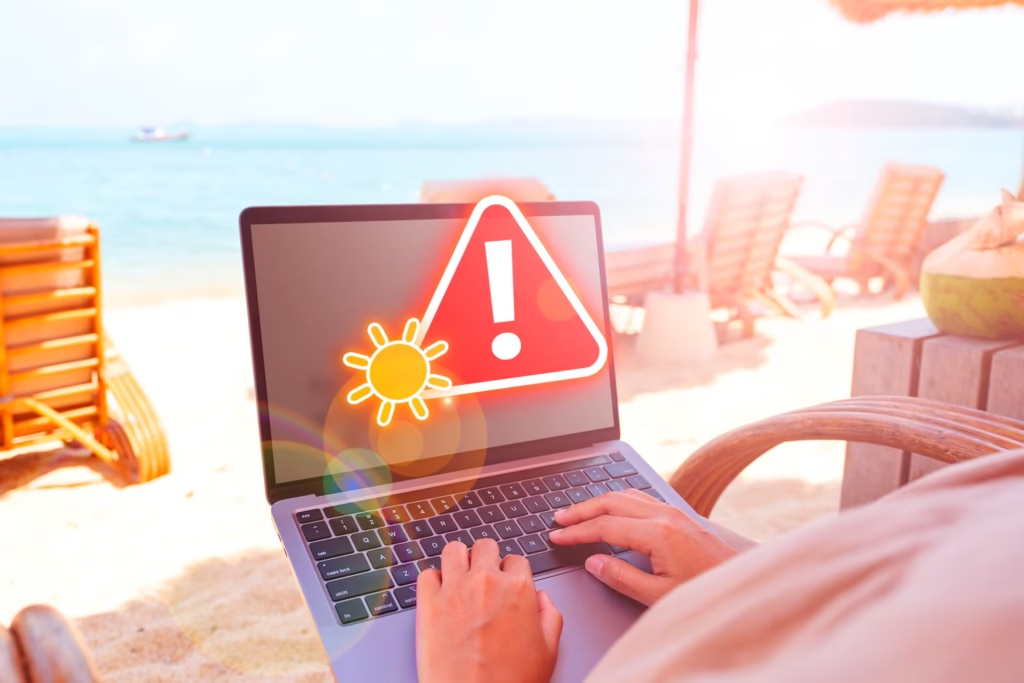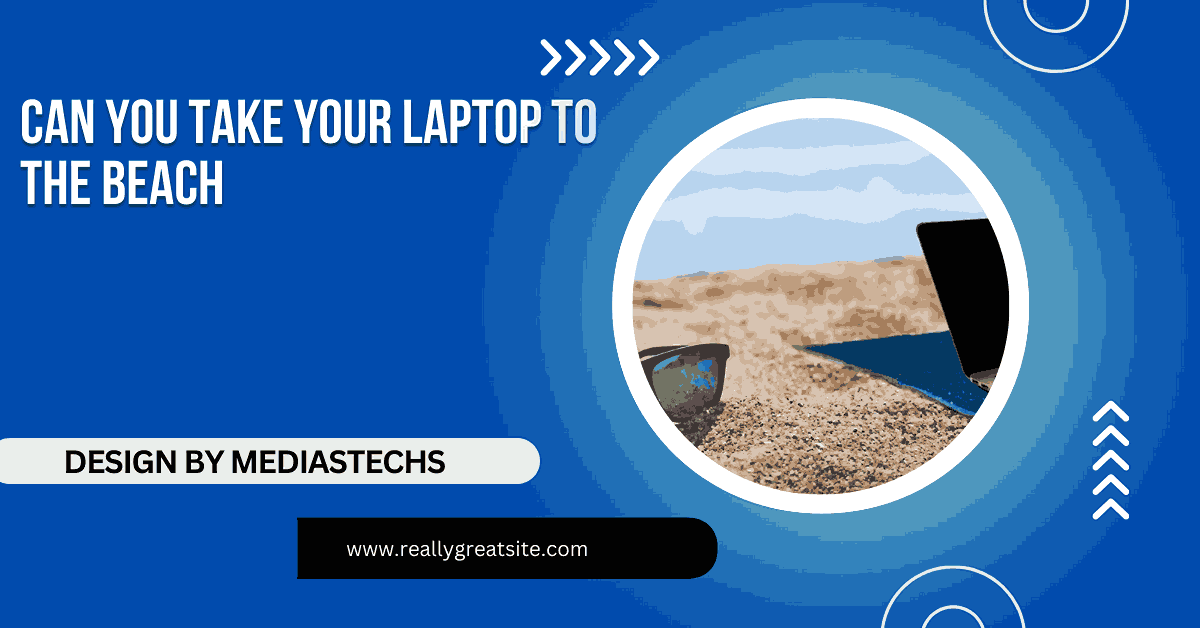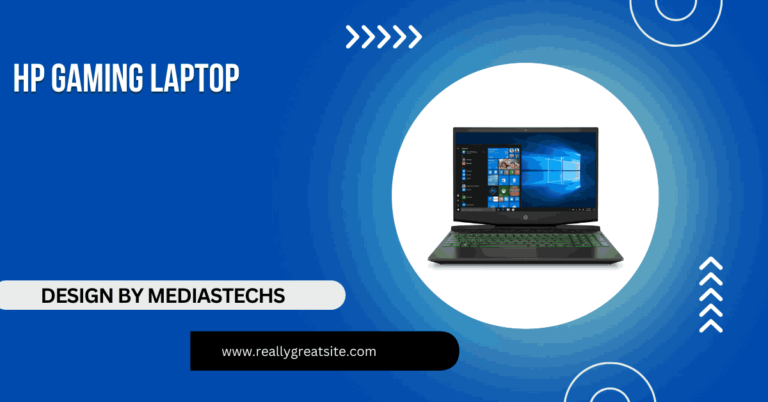Can You Take Your Laptop To The Beach – Everything You Need to Know!
Yes, but protect it from sand, water, heat, and theft with proper precautions. Learn essential tips for a safe beach day with your laptop.
In this article, we explore whether you can take your laptop to the beach and the precautions you should take. Learn how to protect your device from sand, water, heat, and theft with essential accessories and safety tips. Discover practical alternatives if you prefer to leave your laptop behind.
Why You Might Want to Take Your Laptop to the Beach?

There are numerous reasons someone might want to bring their laptop to the beach. Here are a few common ones:
a. Work on the Go:
Remote workers and digital nomads enjoy the idea of working from the beach, whether they’re freelancers or employees working remotely. With an ocean view as your backdrop, even the most tedious spreadsheets can feel a little less stressful.
b. Entertainment and Streaming:
Imagine watching your favorite show or playing games while the sound of waves creates the perfect soundtrack. A laptop allows you to watch movies, listen to music, or connect with streaming platforms, adding entertainment to your relaxing beach trip.
c. Photography and Content Creation:
Beach vacations are often filled with Instagram-worthy moments. If you’re a content creator, you might want to edit your photos or videos right away. Having your laptop handy makes it easier to transfer and edit your shots.
Read More:http://Asus Tuf Gaming A15 Laptop Drivers Fa507re – A Complete Guide!
d. Staying Connected:
Sometimes, you may need to reply to emails, catch up on social media, or stay connected while you’re away from home. Having a laptop allows you to stay connected even during leisure time.
While the benefits are plenty, the risk factors also need careful consideration before you pack your laptop for a beach trip.
Potential Risks of Taking Your Laptop to the Beach:
Although taking your laptop to the beach can be convenient, there are some risks involved. These include:
a. Sand is a Huge Threat:
Sand might seem harmless, but it can wreak havoc on your laptop. It can get into your laptop’s keyboard, ports, and vents, potentially damaging the internal components.
b. Water and Humidity Risks:
Beaches are near the ocean, and water can damage electronics very quickly. Your laptop can be exposed to accidental splashes, waves, or even just high humidity.
c. Heat Exposure:

Laptops are not designed to withstand extreme heat. Sitting in the sun for too long can overheat your laptop, potentially causing performance issues or permanent damage.
d. Theft Concerns:
Beaches can attract opportunistic thieves. Leaving your laptop unattended or even near your towel can make it an easy target for theft.
e. Sunlight Glare and Visibility Issues:
Using a laptop in direct sunlight can lead to poor visibility on the screen. The bright sun reflects off the screen, making it difficult to see the display.
Understanding these risks will help you take the necessary precautions if you decide to bring your laptop with you.
How to Safely Bring Your Laptop to the Beach:
So, can you take your laptop to the beach without it getting damaged? Absolutely! However, you’ll need to plan carefully and follow certain precautions to ensure your laptop stays protected. Below are essential tips:
a. Invest in a Waterproof Laptop Case:
One of the most important things you can do is protect your laptop with a waterproof or water-resistant laptop case. These cases will keep sand, water, and dust at bay, ensuring your laptop stays safe. Look for a padded case with a zipper to prevent sand from sneaking in.
Read More:http://Asus Rog Laptop Print Screen Not Working – Troubleshooting Guide
b. Use a Laptop Screen Protector:
While most beach trips involve sun exposure, it’s wise to have a screen protector to shield your laptop’s screen from glare and direct sunlight. It can make visibility much better and keep your device in pristine condition.
c. Bring a Portable Laptop Stand or Sunshade:
The sun can make it difficult to see your screen. A portable laptop stand or sunshade can minimize glare and make it easier to view your screen, even on a bright day.
d. Avoid Using Your Laptop in Direct Sunlight:
Even with precautions, it’s best to avoid leaving your laptop in direct sunlight for long periods. Heat can severely damage internal components, and prolonged exposure will drain your laptop’s battery much faster.
e. Keep Your Laptop Away from Water:
Avoid taking your laptop near the waves, and always keep it away from potential splashes from water. If you’re near a beach umbrella, make sure your laptop isn’t exposed to unexpected wind or water movement.
f. Backup Your Data Before Your Trip:

The beach is unpredictable—spills, splashes, or sand can damage your laptop at any moment. Always back up important files to the cloud or an external hard drive before taking your laptop with you to the beach.
g. Secure Your Laptop to Prevent Theft:
Never leave your laptop unattended. Keep it in your sight at all times, and consider investing in anti-theft gear like a laptop lock or portable safe to secure it while you’re swimming.
Essential Accessories to Bring for Beach Protection:
Here are some accessories you should consider bringing along when taking your laptop to the beach:
Waterproof or Water-Resistant Laptop Bag:
A waterproof bag will protect your laptop from accidental splashes and sand exposure.
Cooling Pads and Fans:
Sand, sun, and heat can lead to overheating. A portable cooling pad can keep your laptop running at its best while minimizing heat buildup.
External Hard Drive or Cloud Storage:
For backup purposes, always store your important files in an external hard drive or on cloud storage like Google Drive, Dropbox, or iCloud.
Laptop Screen Hood:
If you plan on streaming or editing at the beach, a screen hood will protect your visibility and improve your experience.
Anti-Theft Locks:
These are simple mechanisms that allow you to tether your laptop to a secure location, preventing theft while you’re away from your belongings.
Portable Power Banks:
Beach trips can drain your laptop’s battery quickly. Having a portable power bank with sufficient capacity can ensure you stay connected even on long beach days.
Alternatives to Bringing Your Laptop to the Beach:

While taking a laptop to the beach can be useful for work or entertainment, you might prefer other alternatives to ensure you’re not exposing your device to unnecessary risks. These include:
a. Bring a Tablet Instead:
Tablets are smaller, lighter, and easier to protect from sand and water. They can handle entertainment needs like streaming movies or checking emails without the same risks as a full-sized laptop.
b. Read a Book or Magazine:
Sometimes, it’s best to leave tech behind and unwind with a physical book or magazine.
c. Use Your Smartphone for Basic Tasks:
Your smartphone can handle most tasks like checking emails, watching videos, or streaming music while being easier to manage and much less likely to be damaged by sand and water.
FAQ’s
1. Can sand damage my laptop at the beach?
Yes, sand can get into your laptop’s keyboard, ports, and vents, causing serious damage. Always protect it with a waterproof case.
2. Is it safe to use a laptop in direct sunlight?
No, sunlight can overheat your laptop and make the screen hard to see. Use a laptop stand or shade for visibility.
3. How can I prevent my laptop from getting wet at the beach?
Use a waterproof laptop case or bag and keep your laptop away from waves and splashes.
4. What should I bring to protect my laptop at the beach?
A waterproof case, cooling pad, external hard drive, screen hood, and portable power bank are essential accessories.
5. Can I leave my laptop unattended at the beach?
No, you should never leave your laptop unattended as it can be stolen or damaged by sand and water.
Conclusion:
Taking your laptop to the beach can enhance your experience by providing productivity options, entertainment, and connectivity. However, you must be cautious and prepare properly to avoid risks like sand, water, and theft.
With the right accessories, protective measures, and planning, you can make using your laptop at the beach a stress-free and enjoyable experience.







